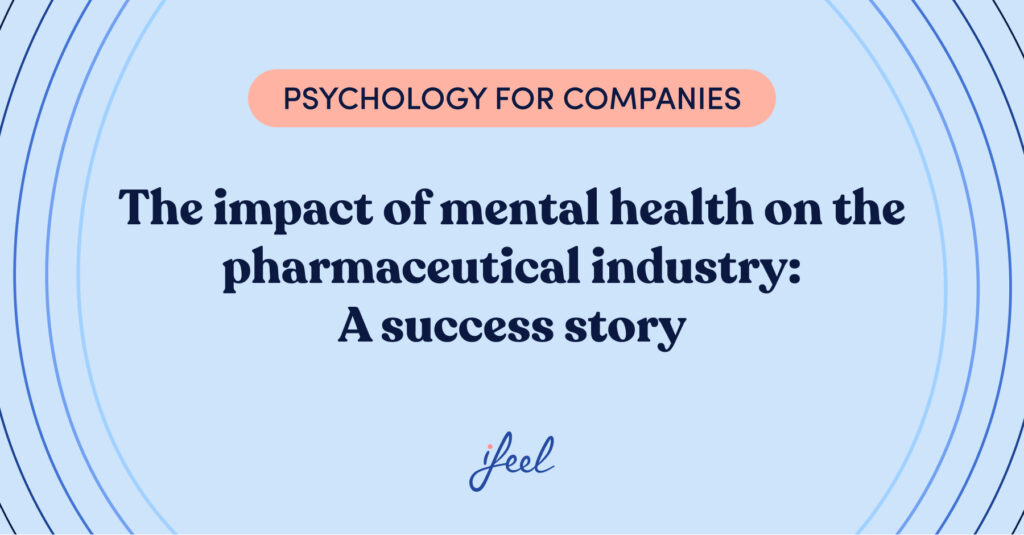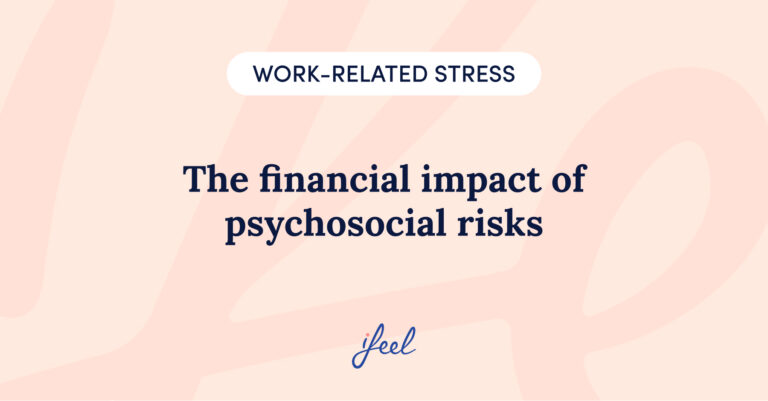The pharmaceutical industry, renowned for its innovation and global impact, faces unique challenges that profoundly affect its employees. This sector operates in a highly demanding environment, from constant pressure to comply with complex regulations to fierce competition and tight deadlines.
However, behind the scientific advancements and business achievements lies a silent crisis: the deterioration of workplace mental health, which gradually undermines business outcomes by eroding employee well-being.
In this article, we shall explore why mental health care has become a priority for the pharmaceutical industry and how solutions like those offered by ifeel are transforming the way companies in this sector address this challenge.
If you would like to know more about this topic, we invite you to download our latest success story, which proves the positive impact of implementing dynamic solutions like ifeel in the pharmaceutical sector.
The mental health crisis in the pharmaceutical industry
Workplace mental health is not merely a matter of personal wellbeing; it is a business imperative. According to recent data, 60% of pharmaceutical industry workers suffer from burnout or mental health issues, representing a significant impact on productivity and operational costs.
This figure not only reflects a public health issue but also a strategic challenge for companies that rely on their human capital to innovate and compete in a global market. Among the main challenges faced by this industry are:
| Challenges in the pharmaceutical industry | Description |
| Shortage of pharmaceutical professionals | Many countries face a shortage of practising pharmacists, increasing workloads and reducing the quality of care. |
| Rapidly evolving healthcare industry | The sector is rapidly changing due to technological advancements, higher service demand and regulatory changes. |
| Burnout and stress | The responsibilities and workload of pharmacists can be overwhelming, leading to burnout and reduced job satisfaction. |
| Limited scope of practice | In some countries, pharmacists’ roles are restricted, limiting their ability to provide comprehensive health services, which affects job satisfaction and career opportunities. |
| Lack of recognition | Pharmacists often do not receive the recognition they deserve for their contributions to the healthcare system, leading to demotivation. |
| Increased demands | Patients expect immediate and personalised care, which can be overwhelming, especially with limited resources. |
| Regulatory burden | Complying with various regulations and documentation requirements can be stressful and time-consuming. |
| Financial pressures | Competitive reimbursement models create financial pressures and business objectives that impact pharmacists’ job satisfaction. |
These data highlight the key challenges faced by the pharmaceutical industry, underscoring the need for comprehensive solutions to improve employee well-being and performance.
Why prioritising mental health is a smart strategy
Mental health is not just an HR issue; it’s critical to business sustainability and success. Studies indicate that mental health problems cost companies globally more than $1 trillion annually due to lost productivity.
In the pharmaceutical industry, where human talent drives innovation, ignoring this problem can have catastrophic consequences. For instance, surveys reveal that 73% of pharmacists have considered leaving their jobs or the profession, whilst 88% are at high risk of burnout. These figures underscore the need for greater support for workers in this industry to care for their mental health and well-being.
Factors exacerbating the situation:
- High Levels of occupational Stress: Patent expirations, regulatory complexities and intense merger and acquisition activities create a high-pressure environment.
- Digital transformation and automation: Up to 90% of roles in this sector are being redesigned, increasing uncertainty and resistance to change.
- Impact of the pandemic: The global health crisis has exacerbated mental health issues, highlighting the need for scalable and effective solutions.
Many pharmaceutical companies have turned to employee assistance programmes (EAPs) as an initial solution to address these mental health challenges in the workplace.
However, these programmes have proven inefficient and unsuccessful due to inherent limitations, such as low participation rates (around 4.5%), restricted accessibility to business hours and a reactive approach that fails to adapt to employees’ changing needs. These shortcomings have left companies searching for more effective and scalable alternatives to ensure their teams’ well-being.
“We are increasingly aware of the need to care for our mental health, and employees appreciate and value when their company provides this service.”
ifeel: A comprehensive solution for mental health in the pharmaceutical industry
As strategic partners to leading companies in the sector, ifeel has developed an innovative, data-driven approach to tackling mental health challenges in the pharmaceutical industry. ifeel’s solution combines advanced technology, predictive analytics and personalised care to deliver measurable results both clinically and financially.
The solution is built on four key pillars:
Identifying real risk:
- AI-based audits to detect high-risk areas.
- Dynamic dashboards that provide predictive insights for proactive strategic planning.
Personalised plans for every employee:
- Access to therapists in less than 24 hours.
- 24/7 self-care resources, including meditation tools and educational content.
Prevention culture:
- Workshops and training on stress management and emotional resilience.
- Internal campaigns to normalise conversations about mental health.
Continuous measurement and optimisation:
- Analytical tools to identify burnout risks and make agile adjustments to strategies.
Transformative results: The impact of ifeel on a pharmaceutical company
A recent case study demonstrates how ifeel helped a pharmaceutical company transform its approach to mental health. The results include:
- Reduction in absenteeism rates to 8.36%.
- Annual mental health costs decreased from €20.2M to €16.2M.
- A 7% decrease in the percentage of employees classified as high-risk.
The implementation of ifeel also increased employee engagement by 30% and productivity by 20%, generating a significant financial impact with savings of €4.05 million in the first year and a cumulative projection of €12.15 million over three years.
Additionally, 86% of employees are now classified as low-risk, reflecting a more resilient workforce prepared for the sector’s challenges. Finally, reducing the stigma associated with mental health and fostering an inclusive and resilient workplace environment achieved a transformative cultural impact.
If you would like more information on how ifeel transformed this pharmaceutical industry, we invite you to download our latest practical success story. It details and demonstrates the positive impact of implementing comprehensive solutions like ifeel in the pharmaceutical sector.
The Leadership Lens🔎
Leaders in the pharmaceutical industry have the power to transform mental health in the workplace from the ground up. A recent success story, such as the one described above, demonstrates that integrating mental health solutions for businesses not only improves the quality of life of employees, but also business results.
The key? Create open spaces for dialogue, promote flexible policies, and lead with empathy. Remember: investing in mental health is not only a human issue, but also a strategic one for the future of any pharmaceutical organisation.
The imperative solution to one of the biggest challenges of our time
The pharmaceutical industry faces unique challenges that require innovative and scalable solutions. ifeel offers a comprehensive approach to addressing mental health issues and provides tools to measure its impact and optimise results.
Mental health is an issue that cannot wait. Companies like yours have the opportunity to lead the change, improving employee well-being and strengthening their position in the market.
Download our latest success story to learn more about this practical case and discover how ifeel can help you implement a comprehensive emotional wellbeing strategy in your organisation.
Don’t wait any longer to transform your organisation. Discover our bespoke solution now and take the first step towards a healthier and more productive future.







